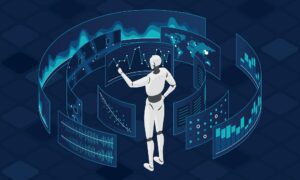Data Science, a field that involves extracting valuable insights from the vast pool of data, is rapidly evolving and offers exciting Career Opportunities. Organizations worldwide rely on Data Scientists to help them make informed decisions, optimize operations, and drive innovation. In this comprehensive guide, we will walk you through a step by step roadmap on How to Become a Data Scientist in 2024 and Career opportunities this year and beyond. We’ll cover everything from the Qualifications and Skills required to the Career prospects and the Latest trends in the Field of Data Science.
In today’s digitally driven world, organizations accumulate an unprecedented volume of data. This data is a goldmine of information waiting to be unlocked, and Data Scientists are the key to this treasure trove. They are the professionals who specialize in analysing and interpreting data, providing insights that guide strategic decisions and lead to innovations.

To Start on the journey of becoming a Data Scientist in 2024, it’s essential to understand the core responsibilities of the role. Data scientists are problem solvers who extract, analyse, and interpret data to uncover valuable insights. They gather and clean data from various sources, perform exploratory data analysis to identify patterns, and create predictive models using machine learning and statistical techniques. Data scientists also play a critical role in feature engineering, model evaluation, and deploying models into production. Their work spans various industries, from optimizing operations to improving products and driving data-driven strategies for success.
Before delving into the roadmap, it’s crucial to differentiate between data analysts and data scientists. While these roles share similarities, they have distinct differences. Data Analysts focus on examining data to uncover meaningful insights and trends, often using tools like Excel and SQL. They use historical data to help businesses make informed decisions. Data Scientists, on the other hand, have a broader skill set. They not only analyse data but also build complex predictive models and develop algorithms. They use programming languages like Python and R to extract deep insights, make future predictions, and create data-driven products. In essence, Data Scientists bridge the gap between data analysis and machine learning to solve complex problems and drive innovation.
To pursue a Career as a Data Scientist in 2024, certain qualifications and skills are essential. These include:

Now, let’s break down How to Become a Data Scientist in 2024 and Break this roadmap into a series of actionable steps:
A bachelor’s degree is often the first step in your journey to becoming a Data Scientist. While there’s no specific degree requirement, fields such as Data Science, Statistics, Mathematics, or Computer Science are commonly preferred by employers. These degrees provide a strong foundation in the quantitative and analytical skills required for the role.
While a bachelor’s degree equips you with theoretical knowledge, it’s essential to gain practical skills in relevant programming languages. Data scientists frequently use Python, R, SQL, and SAS when working with large datasets. Python, in particular, has become a dominant language in the field due to its versatility and extensive libraries for data science.
In addition to programming languages, data scientists need to develop proficiency in various related skills, including:
Certifications are an excellent way to validate your skills and knowledge in specific tools and technologies. Some certifications that can boost your data science career include:
These certifications not only provide a structured learning path but also serve as a valuable addition to your resume.
Internships are invaluable for gaining practical experience and exposure to real world data science projects. When seeking internships, look for roles that include keywords such as data analyst, business intelligence analyst, statistician, or data engineer. Internships provide hands on experience and an opportunity to work with professionals in the field, helping you understand the day to day responsibilities of a data scientist.
Once your internship period is over, you can either join the same company (if they are hiring) or start looking for entry level positions related to data science. Common entry-level roles include data scientist, data analyst, and data engineer. These positions allow you to gain practical experience, expand your knowledge, and work your way up the career ladder.

Understanding how data science is applied in the real world can provide valuable insights into the profession. Let’s take a closer look at a prominent example: Netflix.
Did you know that Netflix extensively utilizes data science to enhance user engagement and content recommendations? Netflix boasts over 120 million users worldwide, and to process all the information generated by their user base, they employ advanced data science metrics. These metrics enable Netflix to provide more accurate movie and show recommendations to its users, ultimately leading to a better user experience.
Netflix’s popular series, “House of Cards” ,was developed using data science and big data. The company collected user data from another political drama series, “The West Wing”, to understand viewer preferences. By analysing user behaviour, such as where viewers stopped when fast-forwarding or rewinding, Netflix could create what it believed to be the perfect engrossing show.
As a data scientist in 2024, you need to master a diverse set of skills to excel in your role. Here are seven key skills that every data scientist should possess:
Data scientists should have a solid understanding of databases, including Oracle, MySQL, Microsoft SQL Server, and Teradata. These databases are essential for data storage, retrieval, and analysis. Proficiency in SQL is particularly important for querying and manipulating data.
Statistics is the foundation of data analysis. Data scientists need to be well-versed in both descriptive and inferential statistics. They use statistics to summarize data, make inferences, and perform hypothesis testing. A strong grasp of probability theory is also crucial when working with uncertainty and making predictions.
Programming is a fundamental skill for data scientists. Python and R are the most commonly used programming languages in the field. Data scientists use these languages to clean, analyze, and manipulate data, as well as to build machine learning models. Proficiency in these languages allows data scientists to work more efficiently and create custom solutions to complex problems.
Data wrangling, also known as data munging, is the process of cleaning, transforming, and organizing data for analysis. Information can be messy and unstructured, so data scientists need to prepare it for analysis. Tools like R, Python, Apache Spark, and Apache Hadoop facilitate data wrangling by offering libraries and functions for data preprocessing.
Machine earning is a core aspect of data science. Data scientists need to understand various machine learning algorithms, including linear regression, logistic regression, decision trees, random forests, support vector machines, k-nearest neighbours, and clustering techniques. Machine learning enables data scientists to build predictive models, make recommendations, and classify data.
In an era of big data, data scientists often work with massive datasets. Knowledge of big data tools such as Apache Hadoop, Apache Spark, and NoSQL databases is essential. These tools allow data scientists to process and analyze large volumes of data efficiently, making it feasible to work with big data.
Effective data visualization is a critical skill. Data scientists need to present their findings and insights in a clear and visually appealing manner. Data visualization tools like Matplotlib, Seaborn, Tableau, and Power BI are commonly used for creating charts, graphs, and interactive dashboards. Clear visualizations help convey complex information to non-technical stakeholders and drive informed decision-making.

Data science offers diverse and rewarding career opportunities across various industries. Here are some of the most common data science-related roles and their average salaries:
Data scientists play a pivotal role in organizations by creating data-driven solutions. They utilize predictive modeling to optimize customer experiences, maximize revenue generation, target advertising, and solve various business problems. Data scientists work closely with data engineers and analysts to extract valuable insights from data.
Data engineers are responsible for managing and maintaining data infrastructure. They design, develop, and maintain the systems and databases that store and transport data. Data engineers work closely with data scientists to ensure data accessibility and reliability for analysis.
Data architects are responsible for designing and managing data systems and structures. They analyze structural requirements for software and develop solutions to store, organize, and access data efficiently. Data architects work to ensure data integrity and security.
Data analysts focus on collecting, interpreting, and analysing data from various sources. They are responsible for providing insights and reports that help businesses make data-driven decisions. Data analysts play a crucial role in identifying trends and patterns within the data.
Business analysts work closely with various departments within an organization to assess their needs and translate them into data-driven solutions. They are responsible for planning, monitoring, validating resource requirements, and creating actionable reports to improve business processes.
Data administrators design, update, and maintain databases. They are responsible for ensuring the security, integrity, and availability of data. Data administrators also create complex query definitions to extract valuable information from databases.

As the world of data science continues to evolve, staying up-to-date with the latest trends is crucial for both aspiring and experienced data scientists. Here are some of the most noteworthy trends shaping the field in 2024:
Artificial Intelligence (AI) and Machine Learning (ML) are at the forefront of data science. With advancements in deep learning, reinforcement learning, and natural language processing, AI and ML are becoming even more powerful and accessible. Data scientists are exploring these technologies to develop innovative solutions and predictive models.
As AI systems become more complex, the need for explainability has grown. XAI focuses on making AI models more transparent and understandable, allowing data scientists to explain model decisions and build trust in AI applications. This trend is particularly crucial in industries like healthcare, finance, and autonomous vehicles.
The ethical use of data and privacy concerns have gained significant attention. Data scientists are now required to adhere to strict ethical guidelines, and the demand for professionals who can ensure data privacy and responsible AI practices is on the rise.
Auto ML tools and platforms are simplifying the process of building machine learning models. They reduce the barrier to entry for those with limited machine learning expertise, making data science more accessible to a broader audience.
Edge computing involves processing data closer to the source, reducing latency and making real-time analysis possible. Data scientists are exploring how to implement data analytics and AI models on edge devices for applications in IoT, autonomous vehicles, and more.
With the increasing relevance of time-series data in various industries, data scientists are focusing on developing sophisticated time series forecasting models. This trend is particularly significant in finance, supply chain management, and energy sectors.
DataOps is a collaborative approach that emphasizes communication and automation between data scientists, data engineers, and other teams. It streamlines the data pipeline, leading to more efficient data-driven decision-making processes.
While still in its infancy, quantum computing is poised to revolutionize data science. It offers the potential to solve complex problems faster and more accurately, making it an exciting area of exploration for data scientists.
The healthcare sector is embracing AI and data science to improve patient care, drug discovery, and medical diagnostics. The integration of data science in healthcare is resulting in groundbreakingly innovations.
With the increasing focus on environmental sustainability, data scientists are using their skills to analyse climate data, develop predictive models for environmental changes, and contribute to initiatives that combat climate change.
The intersection of data science and blockchain technology is strengthening data security and trust. Data scientists are working on solutions to secure data through blockchain and ensure its integrity.
Keeping an eye on these trends and adapting your skills and knowledge accordingly can help you excel in the dynamic field of data science. As the data landscape continues to expand and diversify, data scientists will play a pivotal role in shaping the future of industries across the globe.
Let’s address some FAQ’s about data science:
Data scientists need a diverse set of skills, including a strong foundation in mathematics and statistics, proficiency in programming languages like Python and R, and knowledge of data wrangling, machine learning, data visualization, and big data tools.
Data scientists perform a wide range of tasks, including data collection, data cleaning, exploratory data analysis, model building, model evaluation, and data visualization. They also collaborate with cross-functional teams to solve complex problems.
The career prospects for data scientists are highly promising. The demand for data scientists is rapidly growing across various industries, including healthcare, finance, e-commerce, and technology. Organizations are actively seeking data scientists to make data-driven decisions and gain a competitive edge.
Data scientists encounter challenges related to working with large and complex datasets, choosing appropriate algorithms, and effectively communicating their findings to non-technical stakeholders. Additionally, ensuring data privacy and ethical data use are becoming increasingly important considerations in the field.
In 2024, the role of a Data Scientist is not just about crunching numbers, It’s about making a meaningful impact. By mastering the key skills, adapting to emerging trends, and focusing on ethical practices, you can pave your way to a fulfilling and dynamic career in data science. The data driven future awaits, and with the right knowledge and skills, you can become a data scientist in 2024 and beyond.
So, whether you’re just starting your educational journey or looking to transition into this exciting field, remember that the opportunities are vast, and your contribution as a data scientist can be truly transformative. So, This was Our take on How to Become a Data Scientist in 2024 and For AI ML Jobs visit our Platform
Stay curious, stay informed, and embrace the endless possibilities of data science. Your journey begins now!
Also, Read How to Build a Career in Artificial Intelligence and Machine Learning in 2024.